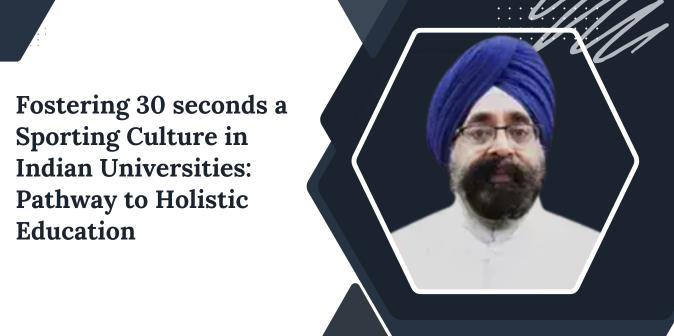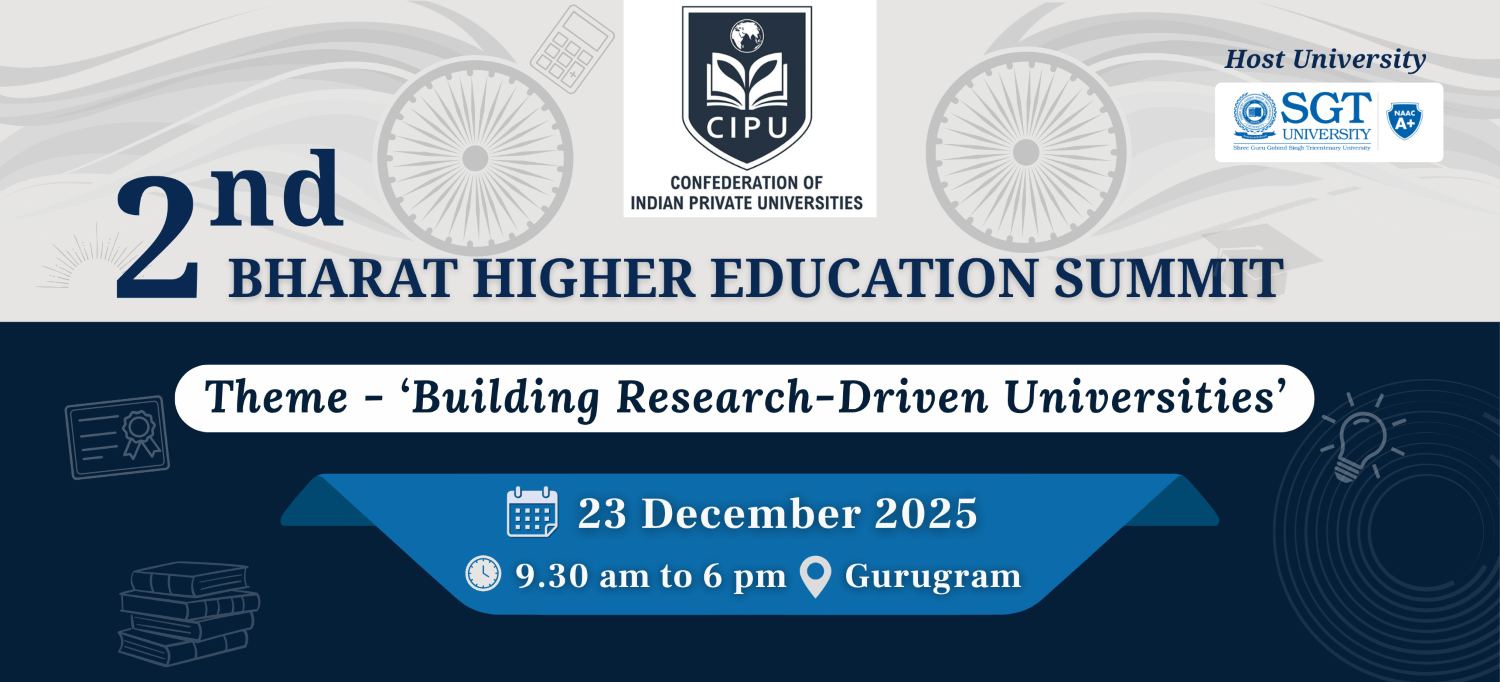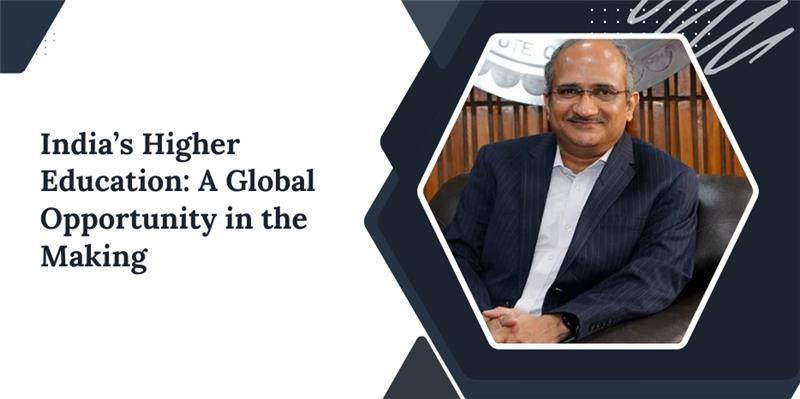
|
Prof. (Dr.) Parvinder Singh
Chairperson, CIPU Northern India Regional Council & Former Vice Chancellor,Lamrin Tech Skills University Ropar, Punjab, Email - drparvinder62@gmail.com |
Indian higher education has largely focused on academic attainment while overlooking the equally vital dimensions of physical health and emotional balance. The result has been graduates equipped with knowledge but often lacking teamwork, resilience, and leadership — traits that define success in real life. Cultivating a strong sporting culture across universities is, therefore, essential to realize the vision of holistic and inclusive education envisioned in the National Education Policy (NEP) 2020.
Sports as a Crucible of Learning
Sports are not simply physical activities; they are laboratories of experiential learning. The playing field teaches values that lectures cannot — discipline, cooperation, fair play, and perseverance. Participation in team sports nurtures leadership as well as humility; one learns to follow directions, handle defeat gracefully, and celebrate collective success. These experiences shape responsible and confident individuals.
Integrating sports withacademics also strengthens intellectual performance. Global studies consistently highlight that regular physical activity enhances memory, focus, and emotional stability. Students who play sports are often better at managing stress and multitasking. Thus, universities that consciously bridge the divide between academic and athletic learning take a decisive step toward creating more balanced and capable graduates.
Challenges in the Present System
Despite India’s long-standing association with physical culture — from yoga to indigenous games like kabaddi and kho-kho — sports in higher education continue to occupy a peripheral role. In many institutions, sports are viewed as extracurricular add-ons rather than integral components of learning. Limited infrastructure, insufficient funding, inadequate coaching support, and lack of structured incentives discourage both participation and excellence.
Another major challenge lies in the rigid academic schedules that often clash with sporting events. Student-athletes are forced to choose between academic success and athletic pursuit, leading to the loss of potential talent. As a result, both the individuals and the institutions miss opportunities to develop a healthy, vibrant, and engaged student community.
Policy Directions and Emerging Practices
The NEP 2020 represents a turning point by emphasizing sports-integrated learning and positioning physical education as a key element of holistic development. Many universities are responding positively to this call. Some have introduced credit-based sports courses, mandatory fitness modules, and sports analytics electives that blend technology, data, and management with athletics.
Many private Institutions such as Lovely Professional University, Chandigarh University, and several central universities have established dedicated departments, athlete scholarships, and interdisciplinary programs connecting sports with psychology, media, and business studies. The Fit India and Khelo India University Games initiatives have further encouraged collaboration, provided funding, and promoted grassroots participation, helping universities create structured sporting ecosystems.
Leadership, Inclusion, and Student Well-being
A thriving sporting Linking Sports with Academics and Careers culture directly contributes to leadership and inclusion. Campus sports clubs, inter-departmental leagues, and annual festivals teach students to plan, organize, and lead — skills that complement classroom learning. Moreover, sports transcend social barriers. They unite students across caste, class, and gender lines, nurturing a shared sense of identity and belonging.
Women’s participation in university sports has improved, yet challenges remain in access, safety, and societal attitudes. Dedicated programs, mentoring, and infrastructural support are needed to ensure gender parity. Likewise, promoting adaptive sports for differently abled students creates a culture of inclusivity and redefines how success and ability are perceived.
Sports also play a crucial role in promoting mental health. Today’s university students face intense academic pressures and digital fatigue, often leading to stress and anxiety. Physical activity provides a natural and positive outlet for emotional release. Team sports foster camaraderie and purpose, improving overall well-being and social connectedness on campus.
Linking Sports with Academics and Careers
For a sustained sporting ecosystem, universities must reimagine the academic-sports relationship. Flexible attendance norms, academic credits for athletic achievement, and dual pathways that accommodate sports and studies can transform the current landscape.
Moreover, emerging career opportunities in sports management, analytics, physiotherapy, event coordination, and media can attract students who wish to combine passion with profession. Collaborations with industries, community organizations, and government agencies can provide internships, mentorship, and exposure, thus bridge the gap between campus learning and real-world experience.
Future opportunities
To embed sports deeply into university life, both infrastructure and mindset must evolve. Investments in multipurpose stadiums, training facilities, and fitness centers are necessary, but equally vital is cultivating appreciation for sports within institutional culture. University leadership should form sports councils, recognize athletic achievements with equal prestige as academic awards, and ensure participation opportunities for all students not just elite athletes.
Community partnerships and alumni engagement can further strengthen these initiatives. Annual sports festivals, local tournaments, and corporate sponsorships can help sustain funding and enthusiasm. Technology can be a game-changer through digital tracking, fitness applications, and virtual coaching, especially for smaller or resource-constrained institutions.
A university that views sports as an essential part of learning prepares its students not only for examinations but for life itself. By fostering a sporting culture, Indian universities can nurture graduates who are intellectually alert, emotionally stable, socially conscious, and physically fit the true hallmarks of holistic education.
Holistic education and life skills
The classrooms of the future will extend to the playgrounds, where character is built alongside competence. Sports, therefore, must not remain a supplement to education but stand at its very heart — as a living expression of energy, discipline, and harmony that define an educated human being.





